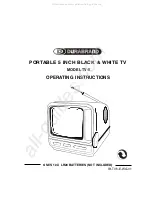
DCA-25SSIU2 (60 HZ)— OPERATION AND PARTS MANUAL — REV. #0 (01/27/06) — PAGE 25
1
DCA-25SSIU2 (60 HZ)— LOAD APPLICATION
Single Phase Load
Always be sure to check the nameplate on the generator
and equipment to insure the wattage, amperage, frequency,
and voltage requirements are satisfactorily supplied by the
generator for operating the equipment.
Generally, the wattage listed on the nameplate of the
equipment is its rated output. Equipment may require 130—
150% more wattage than the rating on the nameplate, as
the wattage is influenced by the efficiency, power factor and
starting system of the equipment.
Motors and motor-driven
equipment draw much greater
current for starting than during
operation.
When connecting ordinary power tools, a capacity of up to
the generating set’s rated output (kW) multiplied by 0.8 can
be used.
If wattage is not given on the
equipment's name plate,
approximate wattage may be
determined by multiplying
nameplate voltage by the
nameplate amperage.
The power factor of this generator is 0.8. See Table 5 below
when connecting loads.
If 3Ø load (kVA) is not given on
the equipment nameplate,
approximate 3Ø load output
maybe determined by multiplying
voltage by amperage by 1.732.
■
■
■
■
■
When connecting a resistance load such as an
incandescent lamp or electric heater, a capacity of up to
the generating set’s rated output (kW) can be used.
■
■
■
■
■
When connecting a fluorescent or mercury lamp, a
capacity of up to the generating set’s rated output (kW)
multiplied by 0.6 can be used.
■
■
■
■
■
When connecting an electric drill or other power tools,
pay close attention to the required starting current
capacity.
NOTE
WATTS = VOLTAGE x AMPERAGE
Three Phase Load
When calculating the power requirements for 3-phase power
use the following equation:
NOTE
An inadequate size connecting cable which cannot carry the
required load can cause a voltage drop which can burn out
the appliance or tool and overheat the cable. See Table 6.
NOTE
Before connecting this generator to any building’s electrical
system, a
licensed
electrician
must install an
isolation
(transfer)
switch
. Serious damage to the building’s
electrical system may occur without this transfer switch.
DANGER - ELECTRICAL SYSTEM HAZARDS
d
a
o
L
y
B
r
o
t
c
a
F
r
e
w
o
P
.
5
e
l
b
a
T
d
a
o
L
f
O
e
p
y
T
r
o
t
c
a
F
r
e
w
o
P
s
r
o
t
o
m
n
o
it
c
u
d
n
i
e
s
a
h
p
-
e
l
g
n
i
S
5
7
.
0
-
4
.
0
t
n
e
c
s
e
d
n
a
c
n
i
,
s
r
e
t
a
e
h
c
i
r
t
c
e
l
E
s
p
m
a
l
0
.
1
s
p
m
a
l
y
r
u
c
r
e
m
,
s
p
m
a
l
t
n
e
c
s
e
r
o
u
l
F
9
.
0
-
4
.
0
n
o
it
a
c
i
n
u
m
m
o
c
,
s
e
c
i
v
e
d
c
i
n
o
r
t
c
e
l
E
t
n
e
m
p
i
u
q
e
0
.
1
s
l
o
o
t
r
e
w
o
p
n
o
m
m
o
C
8
.
0
)
n
o
i
t
a
r
e
p
O
e
s
a
h
P
e
l
g
n
i
S
,
z
H
0
6
(
n
o
i
t
c
e
l
e
S
e
l
b
a
C
.
6
e
l
b
a
T
n
i
t
n
e
r
r
u
C
s
e
r
e
p
m
A
s
t
t
a
W
n
I
d
a
o
L
h
t
g
n
e
L
e
l
b
a
C
e
l
b
a
w
o
ll
A
m
u
m
i
x
a
M
0
2
1
t
A
s
t
l
o
V
0
4
2
t
A
s
t
l
o
V
e
r
i
W
0
1
#
e
r
i
W
2
1
#
e
r
i
W
4
1
#
e
r
i
W
6
1
#
5
.
2
0
0
3
0
0
6
.t
f
0
0
0
1
.t
f
0
0
6
.t
f
5
7
3
.t
f
0
5
2
5
0
0
6
0
0
2
1
.t
f
0
0
5
.t
f
0
0
3
.t
f
0
0
2
.t
f
5
2
1
5
.
7
0
0
9
0
0
8
1
.t
f
0
5
3
.t
f
0
0
2
.t
f
5
2
1
.t
f
0
0
1
0
1
0
0
2
1
0
0
4
2
.t
f
0
5
2
.t
f
0
5
1
.t
f
0
0
1
5
1
0
0
8
1
0
0
6
3
.t
f
0
5
1
.t
f
0
0
1
.t
f
5
6
0
2
0
0
4
2
0
0
8
4
.t
f
5
2
1
.t
f
5
7
.t
f
0
5
.
e
g
a
tl
o
v
w
o
l
m
o
r
f
tl
u
s
e
r
n
a
c
e
g
a
m
a
d
t
n
e
m
p
i
u
q
E
:
N
O
I
T
U
A
C
















































